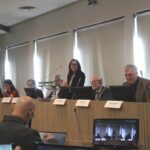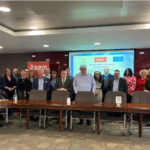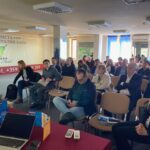Detailed work plan
Work-package 1: Establishment of process and practice for successful project management
Start: 1.03.2021
End: 1.03.2023
Objectives and approach
The Project Steering Committee (PSC) and the Project Research Team (PRT) will be established during the kick-off meeting. They will comprise of one representative from each co-applicant organisations. The PSC will be responsible for the overall management of the central activities and tasks, key decision making and project coordination. The PRT will be responsible for the overall management of the central activities and tasks, key decision making and project coordination. PSC and PRT will comprise of one representative from each co-beneficiary organisation – CITUB, BIA, ETKL, MBB, The Malta Chamber, SIPTU, SEK and OEB.
Proposed activities
Six PSC meetings with the participation of PRT members – during the PSC meetings representative from the Associate organisations may also take part. During the kick-off meeting the PSC will provide a scheme of work and the distribution of tasks (work packages). The PSC will produce a detailed schedule of work and be responsible for quality and time management. The PSC will present dissemination and mainstreaming plan and a strategy for risk management; it will implement continuous and final evaluation; prepare all necessary implementation and financial reports; organise the venues, participants, speakers, etc., for the various events, organise the participation of media for the different events, organise publications and visibility of the project, develop the project leaflet; and coordinate the website and network.
Results
Organised and carried-out six PSC meetings; established and coordinated PSC and PRT; signed Internal Cooperation Agreements; developed detailed project planning, communication and dissemination strategy; coordinated and implemented project activities; defined financial regulations and rules, establishment and elaboration of a continuous control, monitoring and reporting systems, evaluated and monitored project; prepared interim and final implementation and financial reports; project leaflet; maintained and coordinated web-site and network.
Work-package 2: Carrying out research in each partner country of the existing strategies, methodologies and practices related to the implementation of the Framework Agreement on Digitalisation, overcoming the challenges faced by the social partners and how new opportunities are used in different national contexts
Start: 1.04.2021
End: 1.12.2022
Objectives and approach
With regard to the proposed methodology the project will research the national context, existing strategies and methodologies related to the implementation of the Framework Agreement on Digitalisation, the challenges faced by social dialogue deriving from the digital transformation of the world of work, the new opportunities presented by digitalisation. The research methodology will be developed by the Project Research Team, led by the Research Team Leader. The Team will provide guidelines, instructions and content for the data collection and research at national level and the requirements for the content and structure of the National Reports, the Comparative Report and the Catalogue of Good Practices, which will be based on content analysis, expert interviews and an online survey of targeted groups.
Proposed activities
The research will be undertaken in four stages:
- Stage 1 will consist of desk research on the national context, including collective agreements; the national legal framework; existing practices; strategies (including for digital transformation) and methodologies related to the European Social Partners’ Framework Agreement on Digitalisation; challenges faced by social dialogue deriving from the digital transformation of the world of work; new opportunities and ways these are best used; digital skills; work organisation; and work satisfaction and motivation in the five countries (Bulgaria, Estonia, Malta, Ireland, Cyprus)
- Stage 2 will consist of an online survey and expert interviews (up to ten) with selected respondents from the social partners and other key institutions (e.g. national trade union officials, branch officials and shop stewards, HR officers, line managers, sectoral employers’ organisations, public policy experts, academia, etc.).
- Stage 3 will consist of analysis, conclusions and recommendations towards national stakeholders aimed at the implementation of the Framework Agreement on Digitalisation
Results
Analytic Framework for the 3 stages; Developed questionnaires and instructions for the online interviews; Carried out research by each partner (collected figures and data according the analytic framework for the three stages).
Work-package 3: Development of Five National Reports
Start: 1.11.2021
End: 1.02.2022
Objectives and approach
Documentation of all the finding from the three stages of research into structured national reports. The PRT will define the content and structure of the National Reports and send clear instructions to the co-beneficiaries.
Proposed activities
During this work package each co-beneficiary should document the results of the research undertaken in a National Report. All National Reports should be translated into English. They should also be made available on the website of the project in their national languages and in English.
Results
Framework structure and content of the national reports developed by PRT; written, translated into English and published on the website of the project five National Reports.
Work-package 4: Development, organising and carrying out of ten National Info Days (two in each co-applicant country)
Start: 1.09.2021
End: 1.09.2022
Objectives and approach
Organising ten one-day National Info Days (two in each co-applicant country), providing an opportunity for discussion; for awareness raising on the European Social Partners’ Framework Agreement on Digitalisation; an exchange of experiences; capacity building in terms of knowledge related of digital transformation; and the role and impact that social dialogue can play in the process for social development and economic impact. The National Info Days in Bulgaria will be organised jointly by CITUB and BIA, in Cyprus jointly by SEK and OEB and in Malta by Malta Chamber and GWU.
Proposed activities
Defining the topics, agenda and the participants should be decided by every co-beneficiary. These items should be in line with the aims, objectives and research findings of the project. Every co-beneficiary will hold one-day Info Days in 2021 and 2022 with a minimum number of twenty participants.
Results
Carried out ten National Info Days; reports of the National Info Days, conclusions and recommendations for each country will are made available on the web-site of the project.
Work-package 5: Carrying out three European Round Tables involving the Project Team and experts from the associate organisations, representing national and European social partners, academics and National and EU policy-makers for discussions on the role of the European Social Partners’ Framework Agreement on Digitalisation, in the context of its social dimensions at national and European levels
Start: 1.08.2021
End: 1.10.2022
Objectives and approach
Organising and carrying out three European Round Tables (one-day events following the second, third and fourth SC meeting) for discussion and exchange of experience with all stakeholders in the field of social dialogue, digitalisation and its impact on the world of work.
Proposed activities
The PSC will discuss and define the agenda and the topics to be discussed by the three European Round Tables, the presentations, participants, speakers, etc. and, together with the hosting organisations, will agree all of the organisational issues, such as venue, dates, participants, financial issues, etc.
According to the proposed budget, experts from the associate organisations can be represented at the European Round Tables.
The topics of the three European Round Tables could be changed or modified in the course of the implementation of the project and the venues and dates will be decided during the kick-off meeting. According to the detailed work programme:
- The second Steering Committee meeting in Tallinn, Estonia, will be followed by the first European Round Table in the 5th month of the project
- The third Steering Committee meeting in Dublin, Ireland, will be followed by the second European Round Table in the 10th month of the project:
- The fourth Steering Committee meeting in Malta will be followed by the third European Round Table in the 15th month of the project.
For these events an online live streaming will be organised so that, in this way, the project can reach and be disseminated among all interested stakeholders.
Results
Carried out 3 European Round Tables.
Reports of the European Round Tables, conclusions and recommendations for each country published on the web-site of the project.
Work-package 6. Development of a Comparative Report and a Catalogue of Good Practices to assist the employers’ and workers’ organisations to mutually benefit from the opportunities and deal with the challenges through a partnership approach
Start: 1.08.2022
End: 1.12.2022
Objectives and approach
The objectives of this WP will be to compare the results of the national studies for the drafting of a consolidated European Comparative Report, with conclusions and recommendations, and to develop a Catalogue of Good Practices to assist the employers’ and workers’ organisations to mutually benefit from the opportunities and deal with the challenges in a partnership approach.
Proposed activities
On the basis of the National Reports, the conclusions and results from the ten National Info Days and the three European Round Tables, the PRT will summarise the results and make a comparative analysis of the national researches and define conclusions and recommendations for each country and for EU Member States in general. During that stage some materials/analysis developed by Eurofound, the ETUC, the ETUI, other research institutes and universities could be used. The research team will also develop a Catalogue of Good Practices.
The Comparative Report will be approximately 100 pages and it is proposed that 1000 copies will be published. . Five-hundred copies of the Catalogue of Good Practices will also be published. CITUB will be responsible for the layout (design) of the books and also for its publishing and dissemination. The books will be in English and translated into BG / GR / EE. They will also be made available on the project website.
Results
Developed and published European Comparative Report (translated versions of the comparative report in BG / GR / EE, will be available on the project website).
Developed and published Catalogue of Good Practices (translated versions of the Catalogue in BG/GR/ EE, will also be available on the project website).
Work-package 7: Organising and carrying out a Final International Conference
Start: 01.11.2022
End: 1.03.2023
Objectives and approach
The objective of this WP will be to present and disseminate the outcomes of the project to a broad audience and to make conclusions and recommendations; to present the findings of the project research; to spread the knowledge and good practice examples to a broader audience and other countries/regions; and to enhance the mainstreaming of the project results into other national contexts
Proposed activities
One of the main events of the project will be a two-day Final International Conference in Sofia, Bulgaria. CITUB, supported by the PSC, will organise the Conference – each co-beneficiary can invite some participants from their country. Also, a number of experts from the associate organisations and from other relevant organisations and institutions will be invited to make contributions. The PSC will define the agenda for the conference – the speakers, the content, interpretation, etc. All the details regarding the conference will be discussed during the fifth project meeting and decided by all partners.
The Final International Conference, according the work programme, is scheduled for January 2023 in Bulgaria.
Results
Carried out Final International Conference; sustainable and enlarged network of stakeholders for an exchange of good practice experience between the partner countries with other countries and stakeholders with regard to the role of social dialogue and the digital transformation of the world of work.
Work-package 8: Dissemination and mainstreaming activities including elaboration of project logo, creation of a project web-site, project leaflets
Start: 15.03.2021
End: 1.03.2023
Objectives and approach
The objective of this WP will be to present and disseminate the outcomes of the project, to present and share the good practice examples, to distribute all the materials developed during the life-time of the project.
Proposed activities
- Developing and maintaining of a project website
- Elaboration and publishing of leaflets and info materials for the project
- Dissemination of the results of the project by each beneficiary during different events of the respective organisations
- Filled-in participant feed-backs/evaluation forms at every event organised in the context of the project
- Different publications and articles.
Results
- Dissemination, mainstreaming and evaluation plan
- Website of the project
- Leaflets and information materials
- Evaluation forms
- Articles and publications related to the project.





